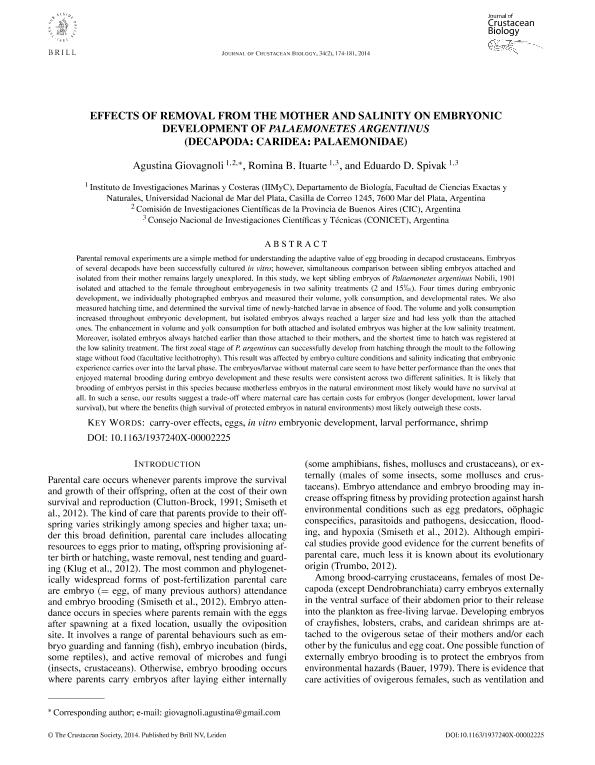Artículo
Effects of Removal from the Mother and Salinity on Embryonic Development of Palaemonetes Argentinus (Decapoda: Caridea: Palaemonidae)
Fecha de publicación:
01/2014
Editorial:
Crustacean Society
Revista:
Journal of Crustacean Biology
ISSN:
0278-0372
Idioma:
Inglés
Tipo de recurso:
Artículo publicado
Clasificación temática:
Resumen
Parental removal experiments are a simple method for understanding the adaptive value of egg brooding in decapod crustaceans. Embryos of several decapods have been successfully cultured in vitro; however, simultaneous comparison between sibling embryos attached and isolated from their mother remains largely unexplored. In this study, we kept sibling embryos of Palaemonetes argentinusNobili, 1901 isolated and attached to the female throughout embryogenesis in two salinity treatments (2 and 15‰). Four times during embryonic development, we individually photographed embryos and measured their volume, yolk consumption, and developmental rates. We also measured hatching time, and determined the survival time of newly-hatched larvae in absence of food. The volume and yolk consumption increased throughout embryonic development, but isolated embryos always reached a larger size and had less yolk than the attached ones. The enhancement in volume and yolk consumption for both attached and isolated embryos was higher at the low salinity treatment. Moreover, isolated embryos always hatched earlier than those attached to their mothers, and the shortest time to hatch was registered at the low salinity treatment. The first zoeal stage of P. argentinus can successfully develop from hatching through the moult to the following stage without food (facultative lecithotrophy). This result was affected by embryo culture conditions and salinity indicating that embryonic experience carries over into the larval phase. The embryos/larvae without maternal care seem to have better performance than the ones that enjoyed maternal brooding during embryo development and these results were consistent across two different salinities. It is likely that brooding of embryos persist in this species because motherless embryos in the natural environment most likely would have no survival at all. In such a sense, our results suggest a trade-off where maternal care has certain costs for embryos (longer development, lower larval survival), but where the benefits (high survival of protected embryos in natural environments) most likely outweigh these costs.
Archivos asociados
Licencia
Identificadores
Colecciones
Articulos(IIMYC)
Articulos de INSTITUTO DE INVESTIGACIONES MARINAS Y COSTERAS
Articulos de INSTITUTO DE INVESTIGACIONES MARINAS Y COSTERAS
Citación
Giovagnoli, Agustina; Ituarte, Romina Belen; Spivak, Eduardo Daniel; Effects of Removal from the Mother and Salinity on Embryonic Development of Palaemonetes Argentinus (Decapoda: Caridea: Palaemonidae); Crustacean Society; Journal of Crustacean Biology; 34; 2; 1-2014; 174-181
Compartir
Altmétricas




